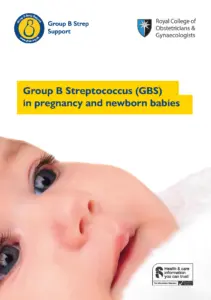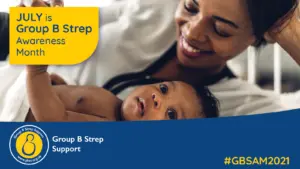16th July 2021
To support Group B Strep Awareness Month 2021, we are delighted to share a Voices blog by Jane Plumb MBE, Chief Executive of Group B Strep Support.
While the focus of raising awareness of group B Strep is so often aimed at expectant parents and their health professionals, it’s important to recognise that approximately a third of the babies who develop these infections in the UK are between 7 days old and 3 months old (O’Sullivan et al., 2018).
Health visitors have a vital role to play in supporting families by providing information on the key signs of group B Strep infection in babies and what action should be taken.
What is group B Strep?
Group B Streptococcus (Streptococcus agalactiae, group B Strep, Strep B or GBS) is a common bacterium which lives normally and naturally in humans, animals and fish. It lives in the lower intestines of approximately one in every five humans and, in women, the vagina, usually causing no harm to the carrier.
However, although not common, GBS can cause serious infections, mostly in babies in their first few days of life and less often in babies aged 7-90 days, plus in the elderly, peripartum women and the immunocompromised. Group B Strep infections are typically sepsis, pneumonia, meningitis, and focal infections.
Most GBS infections respond well to prompt treatment with appropriate antibiotics (usually inpatient treatment with penicillin). Sadly, even with the best medical care, some will die from their GBS infection, and some of the survivors will have long-term health issues.
Group B Strep in babies
On average in the UK, approximately:
- 2 babies a day develop GBS infection
- 1 baby a week dies from GBS infection
- 1 baby a week recovers with long-term disability
Around two-thirds of group B Strep infections in babies present in the first 6 days of life (early-onset GBS infection), mostly in the first 24 hours. GBS infections are uncommon after the first week of life, and very rare after age 3 months.
Preventing group B Strep infection in babies
Early-onset GBS (EOGBS) infection:
Most EOGBS infections (GBS infections that develop in the first 6 days of life) can be prevented, by giving intravenous antibiotics in labour to women who are carrying the bacteria (Fairlie, Zell and Schrag, 2013).
Most developed countries have introduced a programme of testing pregnant women to determine who should be offered intravenous antibiotics in labour against EOGBS infection. (Le Doare et al., 2017) However, in the UK, we have since 2003 adopted a risk-based approach, and key risk factors that the Royal College of Obstetricians & Gynaecologists (Hughes et al., 2017) (RCOG) recommends should prompt the offer of intravenous antibiotics in labour are:
- having a previous baby with GBS disease
- GBS detected through testing during the previous* or current pregnancy (for example, a urine infection or a vaginal or rectal swab taken)
- preterm labour
- suspected maternal intrapartum infection, including suspected chorioamnionitis or pyrexia
*A woman who carried GBS in a previous pregnancy where the baby was well should be offered the option of either having intravenous antibiotics in labour or having a GBS-specific test during the current pregnancy. If the result is positive, she should be offered intravenous antibiotics in labour.
Although prolonged rupture of membranes is recognised as a risk factor for EOGBS infection, it does not prompt the offer of intravenous antibiotics in labour unless the mother is also known to be carrying GBS.
Late-onset GBS (LOGBS) infection
Approximately one-third of GBS infections in babies present between age 7 days and 3 months (late-onset GBS infection), with the median age at presentation of 23 days1.
Sadly, there are no known ways, at present, of preventing LOGBS infection. One day there will be a vaccine, but this is still being developed.
In April 2021, NICE published updated guidelines on neonatal infection, including new and updated recommendations for EOGBS and new recommendations for LOGBS infection (NICE, 2021)
Awareness is key
It is important that health visitors and the families in their care are knowledgeable about group B Strep. It is especially important that they know what risk factors and what are key signs of GBS infection in babies should prompt action, including an urgent medical review of the baby.
For pregnant women and new parents, charity Group B Strep Support (GBSS) has co-written a leaflet with RCOG which is recommended to be given to all women during pregnancy. This covers pregnancy and EOGBS infection but not LOGBS infection. GBSS has recently been funded to translate this leaflet into 14 additional languages, and these are available to download here.
A summary of the key signs of early- and late-onset GBS infections are available here, together with other free resources aimed at health professionals and the families in their care.
Download group B Strep and pregnancy leaflet
Go to GBSS Professional Resources
 What’s new?
What’s new?
GBS & Pregnancy leaflet in other languages
Thanks to funding from the National Lottery Community Fund, Group B Strep Support has translated the leaflet they co-wrote with the Royal College of Obstetricians & Gynaecologists from English into 14 other languages:
Arabic, Bengali, Chinese, French, Hebrew, Latvian, Lithuanian, Polish, Portuguese, Punjabi, Romanian, Somali, Urdu and Welsh.
We encourage all iHV members to use these translations and flag them to their colleagues, so we can ensure that everyone can access high-quality information on group B Strep, including where English is not their first language.
Virtual Group B Strep in Pregnancy & Babies Conference – watch on-demand now
GBSS held an important conference on group B Strep in June 2021. The event brought together world-leading international experts to talk about group B Strep prevention policies, different testing options, antibiotic usage, and the progress towards a GBS vaccine.
The conference was recorded, and the recordings are available until 3 September 2021 to those who register – click here for more information.
Major trial comparing testing and risk-based approaches to preventing GBS infections in newborns
A ground-breaking randomised-control trial, GBS3 trial (NIHR, 2019) is underway. This will compare the effectiveness of the UK’s current risk-based approach to preventing EOGBS infection with two approaches that involve testing all pregnant women for group B Strep carriage, either at 35-37 weeks of pregnancy or at the start of labour.
Funded by NIHR, the research arm of the NHS, the £2.8m trial will involve 80 hospitals in England, Wales and Scotland, including 320,000 pregnant women and their babies. The results, expected in 2024, will inform future group B Strep prevention policy in the UK.
Find out more about the GBS3 Trial.
July is Group B Strep Awareness Month #GBSAM2021
Group B Strep Awareness month is a time to increase knowledge and awareness of a bacterial infection which, in most cases, can be prevented.
Visit GBSS’s website for more information, and to download information materials designed for families and their health professionals.
Key References
Le Doare, K. et al. (2017) ‘Intrapartum Antibiotic Chemoprophylaxis Policies for the Prevention of Group B Streptococcal Disease Worldwide: Systematic Review’, Clinical Infectious Diseases, 65(February), pp. S143–S151. doi: 10.1093/cid/cix654.
Fairlie, T., Zell, E. R. and Schrag, S. (2013) ‘Effectiveness of Intrapartum Antibiotic Prophylaxis for Prevention of Early-Onset Group B Streptococcal Disease’, Obstetrics & Gynecology, 121(3), pp. 570–577. doi: 10.1097/AOG.0b013e318280d4f6.
Hughes, R. G. et al. (2017) ‘Prevention of Early-onset Neonatal Group B Streptococcal Disease: Green-top Guideline No. 36’, BJOG: An International Journal of Obstetrics and Gynaecology, 124(12), pp. e280–e305. doi: 10.1111/1471-0528.14821.
NICE (2021) ‘Neonatal infection: antibiotics for prevention and treatment NICE guideline’. National Institute for Health and Care Excellence, p. NICE Guideline No 195. Available at: www.nice.org.uk/guidance/ng195 (Accessed: 11 July 2021).
NIHR (2019) New screening trial aims to improve detection and treatment for Group B Strep in pregnant women. Available at: https://www.nihr.ac.uk/news/new-screening-trial-aims-to-improve-detection-and-treatment-for-group-b-strep-in-pregnant-women/20283 (Accessed: 29 November 2019).
O’Sullivan, C. P. et al. (2018) ‘Group B streptococcal disease in UK and Irish infants younger than 90 days , 2014 – 15 : a prospective surveillance study’, The Lancet Infectious Diseases. Elsevier Ltd, 3099(18), pp. 1–8. doi: 10.1016/S1473-3099(18)30555-3.



